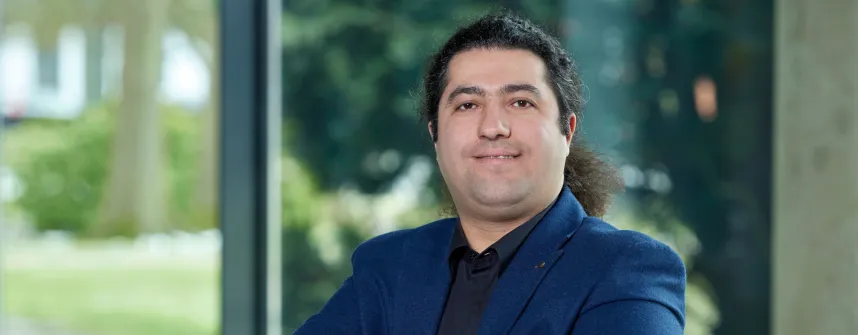New research findings: Healthy aging with virtual aids
Can elderly people really learn how to use new technologies and adapt themselves in learning new tools? The answer, according to researcher Dr. Amir Jahanian Najafabadi and colleagues at Constructor University in Bremen, is yes. His studies, recently published in the Journal of Experimental Brain Research on June 12th, 2023, point to findings indicating that elderly individuals are just as capable as their younger counterparts to master new tools and technologies.
The perception that we lose the capability for learning new skills and being efficient when aging is widely spread. “In many cases older people feel excluded from younger generations and become heavily dependent on others in their everyday-lives, even though, this does not necessarily have to the case,” Jahanian Najafabadi explained the motivation of him to initiate and continue his studies in healthy aging.
The scientists used augmented and virtual reality in their research. The test subjects, including a group of 41 people aged 60 to 84 and a group of young people 18-35, had to enclose a virtual object with a virtual gripper while wearing VR goggles. "The older participants needed a little more time and training, sometimes, but in the end, they mastered the tool-use just as well as the younger ones," Jahanian Najafabadi said. "Age has no negative effect on learning how to use these tools. The brain is still able to adapt and learn even difficult tasks."
However, both studies also revealed noticeable differences: While younger participants perceived the virtual tools such as a gripper as part of their body when grasping an object and experienced control over the tool in the virtual reality world, older people perceived it differently as an external tool that extends the hand to reach and grasp the object. A combination of visual and haptic feedback improved training effects in both age groups which suggests how relying on combination of different sensory and tactile information may help better learning.
Jahanian Najafabadi strongly believes that training in a virtual environment holds immense potential for enhancing scientific studies and facilitating learning in our everyday lives. One compelling application involves the development of rehabilitation programs tailored to patients diagnosed with neurological disorders such as stroke, and to aid them in their recovery and overall well-being.
Since 2019, Jahanian Najafabadi has been researching and teaching at Constructor University, where he founded the Interdisciplinary Neuroscience Society (INS). The well-being of the elderly is close to his heart. “Studying aging is crucial in today's world due to the increasing aging population. By focusing on understanding and addressing the challenges and opportunities associated with aging, we can strive to build a healthier, more inclusive, and sustainable future for all current and later generations,” he said. As part of the private university's "Community Impact Project," in which students and scientists are committed to the well-being of the immediate neighborhood of the university, he plans to publish a booklet together with the INS. It will contain practical, everyday advice for exercising the brain for healthy aging and encourage the elderly to participate in daily activities either individually or as a group.
Links to the studies:
https://link.springer.com/article/10.1007/s00221-023-06644-3
https://link.springer.com/article/10.1007/s00221-023-06645-2
Questions answered by:
Dr. Amir Jahanian Najafabadi | Adjunct Researcher to Professor Dr. Ben Godde
ajahaniannajafabadi@constructor.university | Tel.: +49 421 200-3045
About Constructor University:
An international community, vibrant and diverse. Offering academic excellence, ensuring the highest standards in research and teaching. Empowering students to solve the world's pressing challenges through knowledge and science: Constructor University is a top-ranked, English-speaking, private university. Founded in 2001, it provides a wide range of 25+ academic programs and PhD. The Constructor ecosystem comprises the University, located in Bremen, Germany, and an institute in Schaffhausen, Switzerland.
Over 1.800 students from more than 110 nations on campus benefit from a unique interdisciplinary, foundational theoretical and practical education. Enriched with a buzzing entrepreneurial culture that prepares young professionals to thrive in the job market. With 6.000+ alumni worldwide, our community keeps growing – with our highest cohort ever registered in 2022.
The research-centric faculty projects are funded by the German Research Foundation and the European Union's Framework Program for Research and Innovation as well as by globally leading companies.
The Constructor ecosystem benefits from partnerships with high-ranked universities such as Carnegie Mellon, the University of Geneva or the National University of Singapore School of Computing, and technology companies such as Anisoprint, JetBrains and ChemDiv.
Constructor is a global institution dedicated to addressing the main challenges of the world through science, education, and technology. Apart from the University in Bremen and an Institute in Schaffhausen (Switzerland), the ecosystem relies on several for-profit entities that provide technology infrastructures and solutions, life-long education programs, consulting services, and funding.
